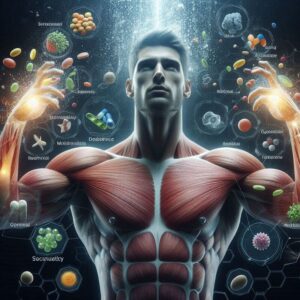Maximize Your Muscle Recovery: Essential Nutritional Strategies for Optimal Performance
Achieving peak muscle recovery hinges on understanding and implementing ideal macronutrient ratios within your daily nutrition. The three primary macronutrients—protein, carbohydrates, and fats—serve not only as vital energy sources but also as essential building blocks crucial for maintaining your body’s structural integrity and supporting various physiological functions. Each macronutrient has a unique role in muscle repair and regeneration, making it imperative for athletes focused on enhancing their athletic performance to grasp how these nutrients work synergistically to optimize recovery processes effectively.
Among these macronutrients, protein is particularly vital for muscle recovery, as it is comprised of essential amino acids pivotal for effective muscle repair and growth. Consuming an adequate amount of protein post-workout significantly enhances muscle protein synthesis, which is the biological process that results in the formation of new muscle proteins while simultaneously reducing the breakdown of existing proteins. This delicate balance is essential for optimal muscle recovery, as it facilitates quicker recuperation and adaptation to the stresses of training. Furthermore, carbohydrates are crucial for replenishing glycogen stores depleted during intense workouts, thus providing the necessary energy for subsequent training sessions. Lastly, fats play a supportive role in energy production and the regulation of hormones, both of which are essential for effective muscle recovery.
To identify the optimal macronutrient ratio for your muscle recovery, a personalized approach is vital, taking into account individual factors such as body composition, workout intensity, and specific fitness goals. A common recommendation is to consume a blend of protein and carbohydrates within 30 minutes to 2 hours after exercising to maximize recovery. This timing is critical, as your body enters a heightened state of nutrient absorption, making it the perfect time to nourish your muscles and enhance recovery.

Explore Top Protein Sources to Boost Your Muscle Recovery
Understanding that protein is not merely another dietary element, but a critical factor in muscle recovery, is essential for anyone participating in physical training. This essential macronutrient provides the amino acids necessary for both effective muscle repair and growth, making it crucial to incorporate protein-rich foods into your diet to enhance muscle restoration efficiently. High-quality sources of animal protein, such as eggs, dairy products, lean meats, fish, and poultry, offer complete amino acid profiles that are particularly beneficial for muscle regeneration and recovery.
For those who prefer plant-based options or wish to diversify their protein sources, there exists a wide variety of excellent alternatives. Foods like lentils, chickpeas, and black beans are not only rich in nutrients but also packed with protein, contributing positively to muscle recovery. Additionally, versatile options such as tofu, tempeh, edamame, and other soy-based products serve as fantastic complete protein sources that can be easily incorporated into a balanced diet to support muscle healing.
Moreover, protein supplements like whey, casein, or plant-based powders can be remarkably effective in increasing your protein intake specifically for muscle recovery. These supplements offer a convenient method to ensure you meet your post-workout protein needs, allowing for easy addition into your favorite smoothies, shakes, or meals, thereby maximizing your recovery potential and supporting your overall fitness journey.
Replenish Glycogen Stores with Carbohydrates for Enhanced Muscle Recovery
Carbohydrates are essential for muscle recovery, primarily by replenishing glycogen stores that are depleted during vigorous physical activity. Consuming carbohydrates within the first 30 to 60 minutes post-exercise can significantly aid in restoring energy levels and accelerating muscle recovery. During intense workouts, muscles primarily rely on glycogen as their main energy source, and the body is most efficient at storing glucose immediately after exercise. Thus, the timing of carbohydrate intake is crucial and can greatly influence muscle glycogen synthesis and overall recovery outcomes.
Incorporating a diverse range of nutrient-dense foods, such as legumes, fruits, and vegetables, which are rich in natural sugars and starches, can substantially enhance your muscle recovery while delivering multiple health benefits. These foods are typically high in fiber and packed with essential nutrients, providing a steady release of energy alongside the vitamins and minerals necessary for overall well-being and effective recovery. Prioritizing these complex carbohydrates in your meals allows you to make informed dietary choices that significantly support your body’s nutritional needs and recovery process.
Effective post-exercise nutrition is a critical aspect of muscle recovery. Combining carbohydrates with protein can dramatically enhance muscle glycogen resynthesis and promote effective muscular repair. This powerful nutrient combination also stimulates insulin release, facilitating the transport of glucose and amino acids into muscle cells, further bolstering recovery and repair mechanisms.

Integrate Healthy Fats for Comprehensive Muscle Recovery Support
While discussions about muscle repair often emphasize protein and carbohydrates, dietary fats are equally crucial for a well-rounded approach to recovery and overall health. Healthy fats are integral for hormone production, particularly testosterone, which plays a significant role in both muscle growth and the repair processes that follow exercise. Foods rich in omega-3 fatty acids, such as walnuts, flaxseeds, and fatty fish, provide anti-inflammatory benefits that can help reduce exercise-induced inflammation and expedite muscle recovery. Furthermore, these fatty acids are vital for constructing cell membranes essential for muscle repair.
Incorporating a variety of healthy fat sources, including nuts, seeds, avocados, olive oil, and fatty fish, can offer extensive advantages for your overall health and muscle regeneration. These fats not only enhance the flavor of your post-exercise meals or snacks but also provide essential energy while supporting various physiological processes related to recovery. Explore different healthy fat options and consciously include them in your diet, as your muscles will undoubtedly respond positively to this additional attention!
While fats are a critical part of a balanced diet, moderation is essential. It’s important to steer clear of excessive consumption of unhealthy fats, such as trans and saturated fats, which can increase inflammation and hinder healing and performance. Therefore, achieving the right balance of fats in your diet is pivotal for attaining optimal muscle recovery and overall health.
Prioritize Hydration to Enhance Muscle Recovery Effectively
One of the most frequently overlooked aspects of muscle recovery is the vital importance of hydration. During physical activity, our bodies lose fluids through sweating, and neglecting to replenish these lost fluids can lead to dehydration. This condition can severely impair athletic performance and prolong muscle recovery time. Dehydration negatively impacts nutrient transport to muscles, increases the risk of cramping, and may even cause muscle damage, underscoring the necessity to prioritize hydration.
Maintaining proper hydration not only supports muscle recovery but also contributes to overall health and well-being. Adequate fluid intake aids in nutrient transport, regulates body temperature, and assists in the elimination of waste products. Ensuring you stay well-hydrated before, during, and after exercise is essential for optimizing muscle recovery. While water is the most effective hydration solution, consider incorporating electrolyte-rich beverages like sports drinks or coconut water to replenish lost electrolytes during intense exercise.
Being attuned to your body’s hydration signals is vital for maximizing recovery. Monitoring indicators such as urine color, changes in body weight, and sensations of thirst can provide valuable insights into your hydration status. This self-awareness can help you maintain optimal fluid intake, thereby promoting maximal muscle repair. Additionally, including more water-rich foods, such as fruits and vegetables, can further enhance your hydration and recovery efforts.

Essential Micronutrients That Accelerate Muscle Recovery
Recognizing the importance of micronutrients, which include vital vitamins and minerals, is crucial for effective muscle recovery and overall health. These micronutrients should never be viewed as optional; they are essential components that significantly influence various physiological processes, including exercise performance and recovery. For instance, the antioxidant properties of vitamin C can help mitigate the inflammatory and oxidative stress experienced during exercise, while vitamin D is critical for maintaining bone health and supporting muscle function, both of which are integral for recovery.
Key minerals such as iron, magnesium, and zinc play vital roles in energy production, oxygen transport, and muscle function during physical activity. To support optimal muscle repair, it is imperative to consume a well-rounded diet rich in fruits, vegetables, whole grains, lean meats, and healthy fats, ensuring you receive these essential micronutrients.
While athletes may consider supplementing with specific micronutrients to address deficiencies or meet the increased demands of rigorous training, it’s essential to seek professional guidance. Consulting with a healthcare professional or a certified dietitian before starting any supplementation regimen can ensure both safety and effectiveness, allowing you to feel more informed and confident in your dietary decisions.
Ultimately, food plays a critical role in muscle recovery following intense physical activity. Striking the right balance among macronutrients—including protein, carbohydrates, and fats—along with proper hydration and micronutrient intake, is essential for effective muscle regeneration and enhancing athletic performance. By being mindful of your dietary choices and supplying your body with the necessary nutrients, you can promote quicker healing, reduce the risk of injury, and elevate your overall fitness level.
Answers to Common Questions About Muscle Recovery and Nutrition
What are the primary processes involved in muscle recovery?
Muscle recovery involves a complex and multifaceted process through which muscles repair and rebuild after experiencing physical stress, such as exercise or resistance training. This crucial process is essential for promoting muscle growth and improving overall physical performance, enabling your body to adapt to the demands of training.
How does diet impact muscle recovery outcomes?
Your diet is a fundamental factor influencing muscle recovery, as it provides the necessary nutrients that facilitate muscle repair and growth. Achieving the right balance among macronutrients (protein, carbohydrates, and fats) and micronutrients (vitamins and minerals) is vital for optimizing muscle recovery and enhancing overall athletic performance.
What dietary approach is most effective for promoting muscle recovery?
The most effective diet for muscle recovery typically comprises a balanced combination of high-quality protein, carbohydrates, and healthy fats. Foods rich in protein, such as lean meats, fish, eggs, and dairy products, are particularly beneficial for supporting muscle repair and growth. Carbohydrates are essential for providing energy during workouts and replenishing depleted glycogen stores, while healthy fats contribute to overall health and hormone production.
How much protein should I consume to aid muscle recovery?
The general recommendation for protein intake aimed at muscle recovery ranges from 1.2 to 2.2 grams of protein per kilogram of body weight per day. This range can vary based on individual factors, including activity level, muscle mass, and specific training goals.
Are there specific foods that effectively enhance muscle recovery?
Foods abundant in protein, such as chicken, turkey, salmon, eggs, Greek yogurt, and tofu, are particularly effective in supporting muscle recovery. Additionally, incorporating complex carbohydrates from sources like whole grains, fruits, and vegetables, along with healthy fats from avocados, nuts, and olive oil, can further support muscle recovery and improve overall athletic performance.
Should I consider using supplements to aid in muscle recovery?
While a nutritious, well-rounded diet can generally provide the essential nutrients necessary for muscle recovery, some individuals may find supplementation with protein powders, branched-chain amino acids (BCAAs), or creatine helpful in supporting their recovery and performance goals. It is crucial to consult with a healthcare professional before introducing any supplements into your diet to ensure safety and effectiveness.
This valuable information is brought to you by:
Reliable Sources for Insights on Muscle Recovery and Nutrition
Nourish Your Hair: Protein Intake and Hair Health. https://www.theproteinfactory.pk/blog/protein-and-hair-health/
The Maximum Calorie Intake to Lose Weight | Woman – The Nest. https://woman.thenest.com/maximum-calorie-intake-lose-weight-17436.html
The Article: Optimal Diet for Muscle Recovery appeared first on Acupuncture Cottam.
The Article Muscle Recovery: The Optimal Diet You Need appeared first on https://mcrtherapies.com
The Article Optimal Diet for Muscle Recovery You Need Was Found On https://limitsofstrategy.com
The Article Muscle Recovery: The Optimal Diet You Need First Appeared ON
: https://ad4sc.com


Your insights on macronutrient ratios really hit home for me! I’ve been delving into how my post-workout nutrition impacts my recovery, and I’ve found that timing is just as crucial as the quantities. I’ve started incorporating a mix of fast-digesting proteins like whey right after workouts and then following it up with a solid meal that includes whole-food sources of protein like chicken or lentils.
It’s great to hear that you’re focusing on post-workout nutrition! Timing really can make a huge difference, especially when it comes to recovery. I’ve had some experience with that too. I used to think just hitting my targets was enough, but then I learned that what we eat and when we eat it can really influence how well our bodies recover.
It’s interesting to hear your journey with post-workout nutrition. I think many of us have been through that phase where we believe just hitting our calorie or protein targets suffices. It’s kind of like realizing that working out hard doesn’t just end with the last rep; it’s a whole cycle that includes how we refuel afterward.
It’s great to hear that you’re focusing on post-workout nutrition and how it aligns with your recovery goals. The timing aspect is often overlooked, but I’ve found it makes a significant difference too. I’ve been experimenting with my own post-workout routine, trying to strike a balance between quick-digesting proteins and whole foods.
I totally relate to your focus on timing and nutrition—speaking of delicious recovery meals, I recently came across some great insights on seasonal flavors that celebrate queen conch delicacies.
‘Queen Conch Delicacies: Savor Seasonal Flavors!’
https://netootel.net/queen-conch-delicacies-savor-seasonal-flavors/.
It’s interesting that you’ve been experimenting with mixing quick-digesting proteins and whole foods for your post-workout routine. I’ve found that balance can really enhance recovery. Sometimes, I rush into a shake out of habit, but taking the time to prepare something more whole can really satisfy both body and mind.
It’s really interesting to hear your take on post-workout nutrition and the importance of timing. Striking that balance between quick-digesting proteins and whole foods can definitely be a bit of an art. Everyone’s body reacts differently, so it’s great to hear you’re experimenting to find out what feels best for you. Quick-digesting proteins, like whey or plant-based shakes, can help kickstart muscle recovery right after a workout. On the other hand, incorporating whole foods later on not only provides sustained energy but also offers a range of nutrients that processed shakes might lack.
This is such an important topic! I’ve always been fascinated by the science of nutrition and how it impacts athletic performance, especially when it comes to recovery. I recently began experimenting with my macronutrient intake after workouts, focusing on the right balance of protein, carbs, and fats. I’ve noticed a significant improvement not just in how I feel the day after training but also in my overall performance over time.
Your exploration of macronutrient roles in muscle recovery resonates with many athletes, including myself. I often found that adjusting my carb intake around workouts remarkably affected my energy levels and recovery times. Not only do carbs replenish glycogen stores, but I’ve also seen firsthand how they can improve overall performance in subsequent workouts.
Your insights on the interplay of macronutrients in muscle recovery resonate with my own experiences as an athlete. I’ve found that not only does prioritizing protein in my post-workout meals make a difference, but also timing my carbohydrate intake to replenish glycogen stores has been crucial.
You make an excellent point about the pivotal role of protein in muscle recovery. I’ve often found that timing my protein intake strategically post-workout has made a noticeable difference in how quickly I recover. For instance, I usually aim for a mix of protein and carbohydrates right after exercising, which not only replenishes glycogen stores but also primes my muscles for repair.
This post really resonates with my recent journey into optimizing my own recovery after workouts! As someone who has been focusing on strength training for some time now, I’ve started to pay much closer attention to my nutrition, especially regarding macronutrients and their unique roles. It’s fascinating how each one contributes not just to overall performance, but to the subtle nuances of muscle recovery as well.